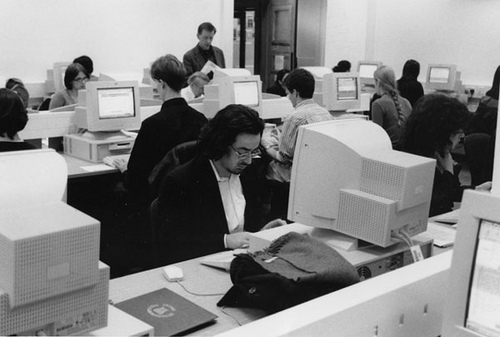In the first post on Internet+human rights+UN ramblings, I posed a dilemma (is the Internet access such a novelty that it must be considered a brand new human right on its own, or is it analogous to other communication tools already covered by human rights documents?), and now it’s time to see where the UN stands in this regard.
If we take a look at Internet (ignoring the human rights bit of things) references in UN documents, the very first one sort of comes up in a document intended for the internal functioning of the UN (to facilitate the coordination of all UN organizations). The link was broken when I tried to include it in this blog post, but I’ll add it when it’s up again (meanwhile, look for the 1997 Annual Overview Report of the ACC. Published by ECOSOC). In this document, universal access to ‘basic communication and information services’ is granted a special spot (by representatives of the UN organizations, not States) because of the ‘potential that the access of governments to basic communication and information services can be had for sustainable development’.
No clear link yet between Internet and human rights, but there one between Internet and development begins to surface.
The acceptance of this relation became a lot clearer in 2002, when the General Assembly proposed the creation of a summit that would cover issues related to ICT and development. In case ‘Internet’ doesn’t seem to be explicitly tied to this, we just need to take a look at the name of the renowned event that was held in 2003 and 2005 to address this proposal: the World Summit on the Information Society.
To understand some of the most important ICT+development implications of this event, I think there are two points that are especially worth noting:
1. As a result of this event, Unesco published a world report titled Towards Knowledge Societies, which presents a model for development that is alternative to the ‘Information Society’ one. In an academic debate that’s used both Information and Knowledge almost interchangeably, Unesco’s stance is clear: information and access to it are just tools; knowledge is not reduced to them, but knowledges (adding the broken English s becomes possible in international debate with that report, even if certain scientists dislike that) are what societies should aim for.
2. The WSIS made sure to make the development+Internet link as explicit as possible in the resulting Declaration of Principles:
“The Internet has evolved into a global facility available to the public and its governance should constitute a core issue of the Information Society agenda. The international management of the Internet should be multilateral, transparent and democratic, with the full involvement of governments, the private sector, civil society and international organizations. It should ensure an equitable distribution of resources, facilitate access for all and ensure a stable and secure functioning of the Internet, taking into account multilingualism.”
So, by the end of 2003, it was clear that the Internet was worthy of international debate, but not isolated from other topics: internet was explicitly linked to development.
Now: I don’t think it is counterintuitive to think that there is a relationship between human rights and development. This relationship may be described in many ways (necessary, contingent, love-hate, parasitic…), but it’s not unheard of.
However, the existence of this relationship, and the one of the UN documents I’ve mentioned above, don’t necessarily imply that there is a clear human rights dimension to this picture. We need a few more premises on this subject.
And that’s where the famous report that started this ‘controversy’ comes in… and where we jump to post III.
